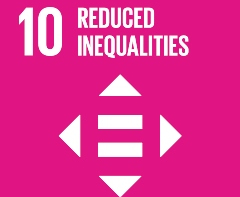.jpg)
Preventing cardiovascular disease through smart technologies
Cardiovascular disease accounts for one in three deaths in Indonesia, and is an increasing cause of mortality across the Global South. Research at The University of Manchester is helping to extend life expectancy and improve public health.
This work delivers on the UN Sustainable Development Goal 10: reduce inequality within and among countries.
Key facts
- 57% of high-risk individuals now identified using life-saving medication that lowers blood pressure
- Awarded the National Innovation Government Award 2019
- SMARThealth programme being scaled up to three million people in the District of Malang
Research shows that nearly 70% of Indonesians aged 40 and over, with moderate to high cardiovascular risk, don’t receive cardiovascular care.
Using partnerships and technology to drive change
To address this need, Dr Gindo Tampubolon, joined a new research-policy collaboration. This collaboration included the Universities of Manchester and Brawijaya, the George Institute for Global Health and the Indonesia and the District Government of Malang. The team trained local health workers (kaders)on cardiovascular disease, risk factors and the technical use of an app called SMARThealth. The app analysed samples in real time, producing a simple traffic light system (green-amber-red) to indicate cardiovascular risk, simplifying the World Health Organization’s complex five-tiered grading systems.
Over two years, doctors and kaders served approximately 48,000 people across eight villages, with 12,000 individuals over the age of 40 screened for heart disease. Results showed a reduction in the risk of cardiovascular deaths by identifying people at risk and then having health professionals prescribe lifestyle and/or drug interventions.
The SMARThealth intervention
The project has significantly reduced cardiovascular care disparities and improved community awareness of non-communicable diseases in the intervention villages.
Lulus Condro Trikoratno / SMARThealth Programme Coordinator, Malang District Health Agency
The SMARThealth intervention improved cardiovascular care for individuals, while increasing the efficiency of community healthcare. Over the two-year trial period, results showed a 14.5% reduction in the number of those at high risk, with improved life expectancy for 3,750 people.
The SMARThealth programme has been adopted by the district of Malang as its own public health programme, and is being scaled up to three million residents in the region. SMARThealth has been commended by the Indonesian government and has won support from healthcare professionals, communities and academics.
Continuing the service
A major socio-medical challenge was to ensure adult villagers respected the kaders, as traditionally they focused on infant and maternal health. The kaders’ central role in the intervention, and their link to doctors via the app, has boosted their status within the community, enhancing the effectiveness of community healthcare more broadly.
This initiative has received further funding to scale up until 2023. The scale-up has continued despite COVID-19, with kaders receiving personal protective equipment to carry out their role safely.
Podcast: Preventing cardiovascular disease through smart technologies
-500x298-edited-160421.jpg)
Listen to The University of Manchester’s Dr Nic Gowland interview some of our leading experts about how their research is helping to deliver the UN Sustainable Development Goals for global health, equality and sustainability.
Download the Preventing cardiovascular disease through smart technologies podcast transcript (PDF, 653KB).


